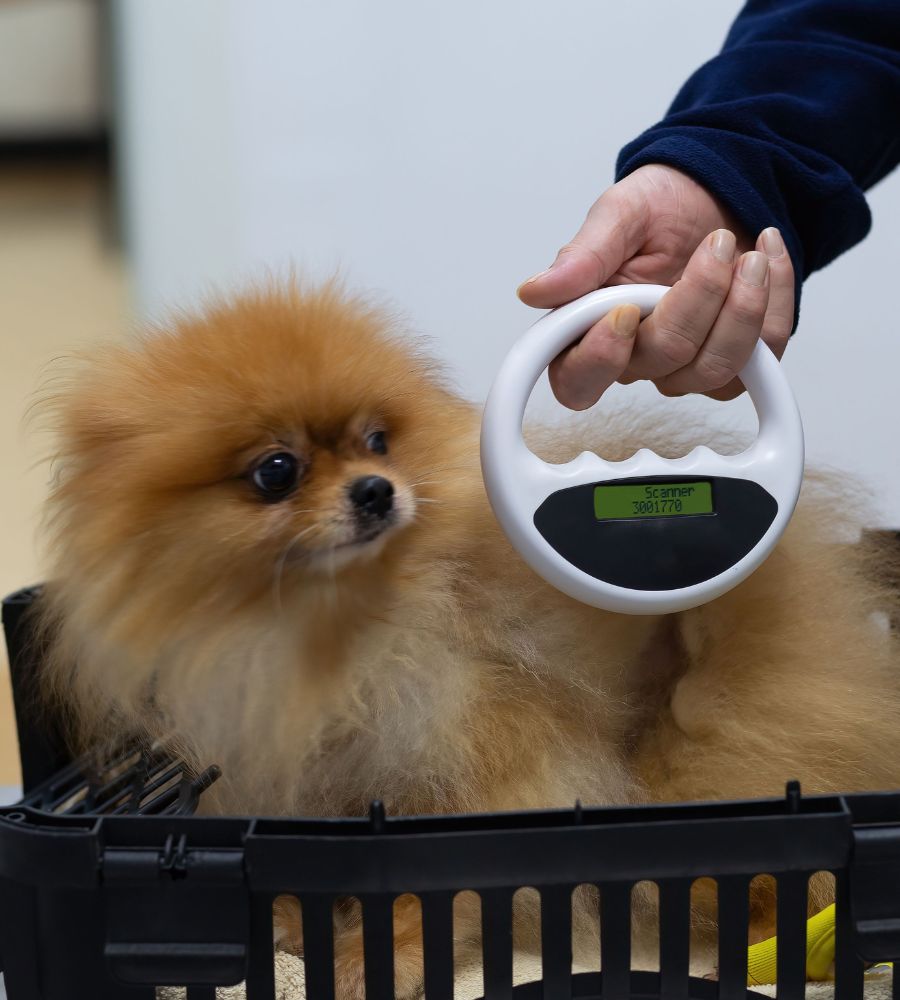Cats & Dogs Microchipping
At Montclair Veterinary Associates, we prioritize your beloved companion’s safety with pet microchipping in Montclair, NJ, as a reliable way to reunite lost pets with their families.

Pet Microchipping in Montclair, NJ
Every year, millions of pets go missing, and only a small percentage are reunited with their families due to a lack of proper identification. Microchipping provides a permanent, reliable identification method that dramatically increases the chances of reuniting lost pets with their owners, offering peace of mind and a lifeline when traditional collars and tags fail.
At Montclair Veterinary Associates, we provide professional microchipping services for cats and dogs, ensuring your beloved companion has the best chance of returning home safely if they ever become lost. Dr. Cory Waxman and our experienced team understand the importance of this simple yet life-saving procedure and make the process comfortable and stress-free for both pets and their families.
Understanding Pet Microchip Technology
A microchip is a tiny electronic device, about the size of a grain of rice, that contains a unique identification number linked to your contact information in a national database. This passive device requires no batteries or maintenance and remains functional for your pet’s entire lifetime, providing permanent identification that cannot be lost, removed, or damaged like traditional collars and tags.
When a lost pet is found and brought to a veterinary clinic, animal shelter, or rescue organization, staff members use a special scanner to detect the microchip and retrieve the identification number. This number is then used to search the database and contact the registered owner, facilitating a quick reunion between pets and their worried families.
Modern microchips meet international standards for frequency and size, ensuring compatibility with scanners used by veterinary clinics, shelters, and animal control facilities throughout North America. The technology has proven incredibly reliable, with millions of successful pet reunifications documented over the past decades.
Microchip Safety and Effectiveness
Microchipping is considered extremely safe, with adverse reactions occurring in less than one percent of procedures. The biocompatible materials used in modern microchips are well-tolerated by pets’ immune systems, and the chips become encapsulated by natural tissue formation that keeps them securely in place.
Studies show that microchipped pets are significantly more likely to be returned to their owners compared to pets without identification. Dogs with microchips are returned home over 50% of the time, while cats with microchips have reunion rates exceeding 35%, compared to only 2% for cats without identification.
The Microchipping Procedure
Microchip implantation is a quick, simple procedure that takes just a few minutes and causes minimal discomfort to your pet. Using a sterile needle slightly larger than those used for vaccinations, the microchip is implanted beneath the skin between your pet’s shoulder blades, where it remains safely positioned for life.
Most pets experience only brief discomfort during the injection, similar to receiving a vaccination. No anesthesia is required for the procedure, and pets can resume normal activities immediately afterward. The injection site may be slightly tender for a day or two, but serious complications are extremely rare.
When to Microchip Your Pet
Puppies and kittens can be safely microchipped as early as six to eight weeks of age, making it convenient to combine the procedure with early vaccinations or spay/neuter surgery. Adult pets can be microchipped at any age, and many owners choose to have the procedure done during routine wellness examinations.
Indoor cats benefit from microchipping just as much as outdoor pets, as even the most careful pet owners sometimes experience escaped cats during moves, home repairs, or unexpected situations. Dogs of all sizes and activity levels should be microchipped, as even well-trained pets can become lost during travel, storms, or other unexpected circumstances.
Maintaining Your Microchip Registration
Registering your pet’s microchip with accurate, up-to-date contact information is crucial for the system to work effectively. The microchip itself contains only an identification number, so maintaining current information in the database ensures you can be contacted if your pet is found.
Update your registration information whenever you move, change phone numbers, or transfer ownership of your pet. Most microchip companies provide online portals where you can easily update your contact details, emergency contacts, and your pet’s medical information.
Additional Benefits of Microchipping
Beyond pet identification, microchips can store important medical information about your pet, including vaccination records, medical conditions, and emergency veterinary contacts. This information can be invaluable if your pet requires emergency medical care while away from home.
Some microchip services offer additional features such as travel assistance, medical insurance discounts, and 24-hour helplines for pet emergencies. These value-added services can provide extra peace of mind for pet owners who travel frequently or have pets with special medical needs.
Combining Microchips with Other Identification
While microchips provide permanent identification, they should be used in combination with visible identification such as collars and tags. External identification allows Good Samaritans to contact you immediately without needing to visit a veterinary clinic or shelter for scanning.
Consider using breakaway collars for cats and properly fitted collars for dogs that include your current phone number and any important medical information. GPS tracking collars and smart tags offer additional location services but should supplement, not replace, microchip identification.
Professional Microchipping Services
Montclair Veterinary Associates provides professional microchipping services using the latest technology and sterile techniques to ensure your pet’s safety and comfort. Dr. Waxman has been serving pets in Northern NJ since 2011 and understands the importance of proper identification for keeping families together during unexpected situations.
Don’t wait until your pet goes missing to consider microchipping. This simple procedure takes just minutes but provides a lifetime of protection and peace of mind for you and your furry family member. Call Montclair Veterinary Associates at (973) 321-7229 or schedule an appointment online to discuss microchipping options and ensure your pet has the best chance of coming home safely if they ever become lost.
Frequently Asked Questions about Pets Microchipping in Montclair, NJ
How do animal shelters use microchips to help reunite lost pets with their families?
Many animal shelters and humane societies use a microchip scanner to read the unique identification number from a lost pet’s chip. This microchip number is then matched with the owner’s contact information through a microchip registry. This process allows responsible pet owners to be contacted quickly, significantly improving the chances of a successful reunion, even when pets aren’t wearing collars or identification tags.
What should responsible pet owners know about keeping microchip information current?
Responsible pet owners must ensure their contact information is updated in the microchip registry. The microchip implanted in your pet only stores an ID number, so updating details whenever you move or change phone numbers is crucial. Most microchip manufacturers offer easy online tools to manage your pet’s data, ensuring that if your pet ends up in animal shelters or clinics, they can reach you quickly using a microchip scanner.
Are there different microchip frequencies, and does that affect how they’re read?
Yes, there are various microchip frequencies, but most modern chips in the U.S. follow ISO standards, ensuring compatibility with universal microchip scanners. This allows humane societies, animal shelters, and veterinary clinics to read microchips regardless of brand. The American Animal Hospital Association supports universal scanners to eliminate frequency mismatches and ensure that any microchip number can be identified and traced efficiently.
When is the best time to have a microchip implanted in your pet?
Pets can have a microchip implanted as early as six to eight weeks of age, often during spay/neuter procedures or early vaccinations. This is a good time for responsible pet owners to act. Adult pets can be chipped at any age. Whether your pet is always indoors or ventures outside, microchipping helps many animal shelters and humane societies reunite lost pets with their owners, regardless of the pet’s age or habits.
Do microchips replace the need for identification tags?
While microchips provide permanent ID, they don’t replace visible identification tags. A microchip scanner requires the pet to be brought to a shelter or vet, while tags allow immediate contact. Responsible pet owners should use both methods for the best protection. Many humane societies and animal shelters recommend combining microchipping with tags to increase the likelihood of a fast reunion, especially if the microchip number can’t be scanned right away.
